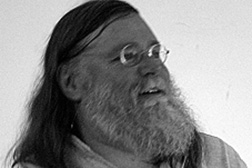Artist and art educator
Holder of Mauermann Exhibition Space, Essen/Germany
RW.9 ZIVILER UNGEHORSAM
Instaled: 01-07-2009
Location | GPS: Mauermann Exhibition Space, Essen, Germany | 51.3940935,7.0885885
Curator: Karl-Heinz Mauermann,
Author: REMOTEWORDS
Roof Size | Font Size: 75qm | 3m x 22m
On Air: –
ZIVILER UNGEHORSAM
Interview: Karl-Heinz Mauermann, Essen 2009
In conjunction with the exhibition “Wir werden es schon getan haben – Raum, Zeit und Subversion” (we will have already done so – space, time and subversion), Remotewords – with CIVIL DISOBEDIENCE – remembers Henry David Thoreau, who in his writings justifies the right of the individual to resist state injustice.
REMOTEWORDS: ›Civil Disobedience‹ on a private roof in an ordinary quiet residential quarter?
Mauermann: Where, if not there? Warhol once said something like »Everybody looks like everybody else and does the same as everybody else, that’s the way we’re going to evolve more and more.«, and also: »In the future, everybody will be world famous for 15 minutes.« Just look at those ›daily soaps‹, those grandmothers sporting the same track suits as their granddaughters, or the standardised gardens and front gardens in residential suburbs.
Fifty years ago, Warhol probably didn’t realise to what extent his predictions were to prove correct. He would have been pleased, for to Warhol that kind of life spelled ›hip‹. Warhol expressed it along these lines: »Everybody should be a machine. I think everybody should like everybody.«
»Civil Disobedience« is a term coined by another eminent American, Henry David Thoreau, someone who sought quite the opposite of a standardised machine existence. He pursued individual freedom and independence by retreating into the woods near Walden pond, where in 1845 he erected a weatherboard shanty and escaped what he, even at this period, considered as a meaningsless mass society, where the majority of people led a ›life of quiet desperation‹. He states: »I went to the woods because I wished to live deliberately, to front only the essential facts of life, and see if I could not learn what it had to teach, and not, when I came to die, discover that I had not lived. I did not wish to live what was not life, living is so dear; nor did I wish to practise resignation, unless it was quite necessary.«
Thoreau’s aim was to escape standardisation, and he pleaded the right of the individual to violate valid legal norms if these represented injustice or infringed upon the freedom of the individual. In this he did not aim at revolution, and civil disobedience also rejects violence. Its chosen means are determined by the requirements of any given situation.
For me, in the first place, it is important, for people to be able to discover, to experience their individuality, their freedom. To be able to become conscious of their personality. This is the prerequisite of claiming one’s individuality. The ways to experience individuality may be various. Besides politics, social commitment, spare time in its classical sense – that is time to be freely disposed of, time designed for reflection – art may be another way. Here the content of the message is being made visible through aesthetic means. For me, the work by remote words is rooted in this context. What better place for this text than on this roof, in this context?

